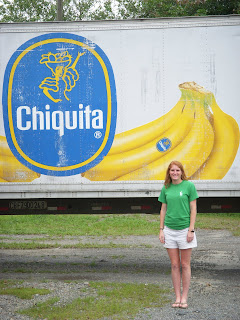
On Saturday we visited the Chiquita banana plantation in Sarapiqui. We got to talk to and ask questions of two of their representatives and tour guides. Chiquita is an inorganic banana producer that has considered switching to organic production, but this would severely decrease the amount of bananas that they could produce and they would not be able to meet the overseas demand. Thus, they still use pesticides, herbicides, and insecticides on the banana plants, which can all have extremely damaging effects on workers and nearby residents, including exposure to carcinogens and toxins. When we drove up, we could see the signs next to the banana fields with skulls and crossbones telling workers not to enter the fields within 24 hours of the pesticide sprayings. However, the workers houses were no more than 10 yards from the fields anyway, so they must be getting some harmful effects just living there. Despite these facts, Chiquita is actually one of the most safe and environmentally friendly banana producers in Costa Rica. All of their agrichemicals are approved by the EPA and the EU, and only minimal amounts of these toxins are used. Chiquita has recently joined the Rainforest Alliance and has started to work on a project in which they employ local residents to plant trees in hopes of replacing rainforest areas from the plantation to La Selva's forests which are about a 30 minute drive away. According to Chiquita, the company has planted at least one million trees in residential areas. Also, working conditions are superb compared to other plantations. Chiquita makes sure that their employess are paid at least 40-50% above the minimum wage. Workers are well trained and are required to use protective clothing and gear at all times. All of their farms in Latin America are certified by independent auditors to the Social Accountability 8000 standard which ensures no child labor, protection of employee health, 48 maximum weekly working hours, and no harsh treatment. Lastly, Chiquita is striving to be as sustainable as possible. All of the twine and plastic bags that are used in the fields are recycleable, and the water is monitored regularly so that traps prevent organic waste from polluting streams and rivers.




While at the plantation, we got to visit the processing and packing site which was really interesting to see happen right in front of you. Half of the bananas that are picked are packaged, while the other half is thrown into a truck. This other half is composed of bananas with the slightest imperfections, and one example of their use is for baby food and other banana products. We also got to watch a show put together by some of the local women that Chiquita employs to teach its visitors all about the bananas. This group of women is called Grupo Nogua, and it is made up of students, homemakers, and agricultural workers from the local communities. Chiquita established this group in 2004 in order to provide additional income for nearby residents as well as to educate tourists and other people about what Chiquita does. We walked through one of the banana fields and learned how the plants are grown, and how the blue bags are used to keep insects from getting at the bananas. Traditionally, most banana plantations used to just toss the plastic bags into a nearby river, but Chiquita uses recyclable bags and makes sure that all of them are reused in some way.
All in all, Chiquita is a relatively sustainable company, at least compared to other banana producers around the world. They are not yet at their full potential and there are still many things that they could improve as to not damage the environment and endanger their workers health. They should start working to find some way to produce bananas organically while still meeting the demand of the rest of the world. For this to happen, Americans and other large consumers of bananas might want to start buying organic bananas only. This way, the demand for Chiquita's bananas would go down, and they would be able to produce them organically. This goal would require many years of change, but it is one step to becoming a more sustainable company.
1 comment:
Cute picture of you with the bananas!!!
Post a Comment